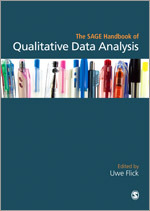The SAGE Handbook of Qualitative Data Analysis
- Uwe Flick - Freie Universtität Berlin, Germany
Qualitative Research (General) | Social Research Methods | Sociological Research Methods
The handbook includes chapters on traditional analytic strategies such as grounded theory, content analysis, hermeneutics, phenomenology and narrative analysis, as well as coverage of newer trends like mixed methods, reanalysis and meta-analysis. Practical aspects such as sampling, transcription, working collaboratively, writing and implementation are given close attention, as are theory and theorization, reflexivity, and ethics.
Written by a team of experts in qualitative research from around the world, this handbook is an essential compendium for all qualitative researchers and students across the social sciences.
Uwe Flick’s handbook of qualitative data analysis is an illuminating new resource for qualitative and mixed methods scholars. What these authors do in exploring how we think when we do analysis will be invaluable for practicing researchers, novices and experienced hands alike. These essays will also provoke further investigation, discussion, and theorizing about what was once the most neglected area of qualitative research practice. The handbook represents the breadth and depth of what we do when we make sense of information we have gathered about our world. It is an exciting contribution to the methodological literature, and I congratulate Dr. Flick and his colleagues for their achievement here.
This is an essential resource for the rapidly expanding ranks of researchers employing qualitative practices of inquiry. It represents the most sophisticated, broad-ranging, and multi-vocal array of contributions to the analysis of qualitative data yet available. There are now many texts on qualitative methods, but this is one is unique. It covers ground largely untouched by others, and with responsible attention to multiple points of view. My enthusiastic congratulations to the editor and authors.
Qualitative data analysis frequently appears to be a mysterious process to students and often experienced researchers alike. This excellent handbook removes the mystery and unveils invaluable insights into all facets of this crucial phase of the research process. I can’t think of a single aspect of analysis that is left without coverage, so that it will become a ‘must read’ for qualitative researchers for many years to come. Uwe Flick is to be congratulated for putting together such an exceptional collection.
This is a comprehensive account of a large variety of approaches to qualitative data analysis, written by leading international experts in the relevant methodological fields. For those who are confused about different analytic methods in qualitative research this book will clarify overlaps and differences, inform readers about the key features of each approach and will in general be an important resource for students and practitioners of social research.
There are many handbooks on qualitative data, but fewer on qualitative data analysis. This book will appeal to those seeking practical guidance on how to analyse various forms of qualitative data and learn about different analytical strategies…This is a really useful and up-to-date reference book, valuable for anyone who wants to expand their analysis toolkit.
With The SAGE Handbook of Qualitative Data Analysis, the editor, Uwe Flick, intends to raise awareness among readers of contemporary debates in qualitative research. The work is not intended to provide definitive answers or to identify the best research approach, but rather to outline the variety in how scientists deal with qualitative data analysis from different disciplinary, epistemological and methodological standpoints... In our view, the value of this work is in the interest in the value and utility of qualitative research, not only within the academic but also in policy-oriented and social contexts.
Good companion for first / second yea r students doing qual research.





